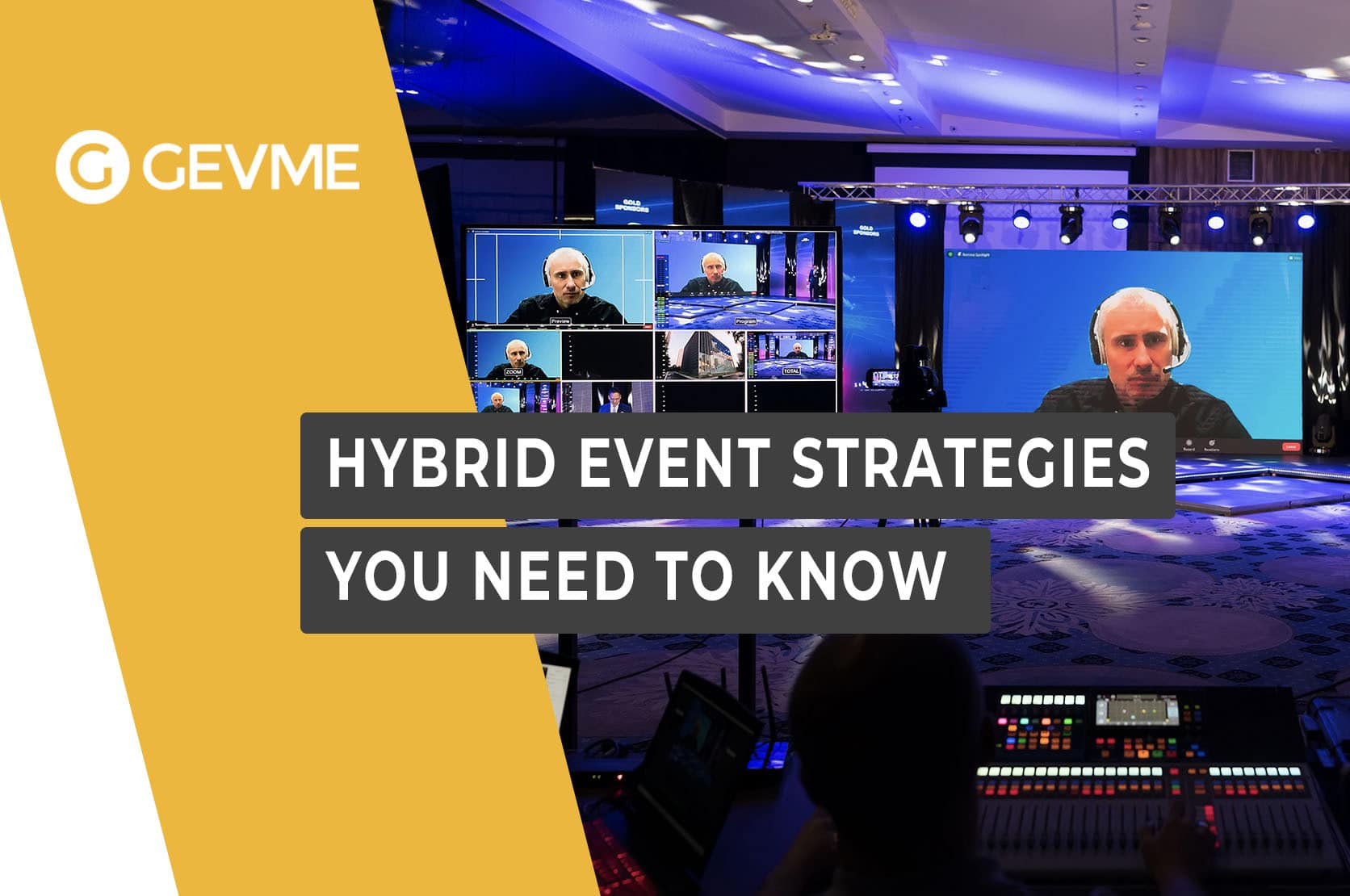The last two years have been instrumental in bringing a whirlwind of changes into the event industry. Physical events, the most popular way to host events in pre-pandemic times, saw a gradual decline as virtual events became everyone’s first choice.
But as the rollout of vaccination drives became pervasive, the event industry saw the rise of another alternative to virtual events – a hybrid event – that promised the best of both worlds to event professionals. So, knowing the most effective hybrid event strategies has now become instrumental.
What is a hybrid event?
A hybrid event combines elements of both in-person and virtual events. It enables attendees and speakers to choose how they wish to participate in the event – by visiting the physical venue or simply checking in through their devices.
Creating purposeful experiences has been fundamental to organising events. Hybrid events have allowed event organisers to do this – by making the choice of attending events resting upon attendees.
Latest survey indicates that 73% of event planners expect hybrid events to be more common in the future. This can perhaps be attributed to the growing advantage that this event format has over others – the ability to bring both online and offline event participants together in real-time.
Why are hybrid events so popular?
It shouldn’t come as a surprise that even after the relaxation of lockdown restrictions in many parts of the world, issues concerning the safety of attending in-person events are prevalent. Travelling also continues to be a major constraint when it comes to attending physical events.
Hybrid events are making it easier for those still on the fence about attending events to get their fair chance of attending events remotely. What’s more, hybrid events are striking out all restrictions posed by physical events. This includes reaching a global audience without any heavy investments – leading to a wider reach. As a result, hybrid events are able to generate greater sponsorships – a bonus for event organisers.
With challenges being faced around in-person networking and engagement, hybrid events are bridging the gap between event organisers and attendees brought about by the new normal.
That said, hybrid events are still evolving. To make these events immersive, event marketers are constantly using technology and creativity.
What are the key hybrid event strategies?
Engage your audience with content
Your hybrid event is more than just a platform to bring together audiences with shared interests. Attendees at an event are looking at things beyond networking – content that makes them engaged. That’s why focusing on content in a hybrid event setup is one of the key strategies.
Engaging content such as presentations, videos, case studies to guides can help you take your hybrid event to the next level. It’s important to note that your content should be accessible to both your in-person attendees as well as your virtual audiences.
But simply presenting content to attendees is not enough. An integral aspect of producing highly-engaging content is to produce it in high quality – similar to broadcast TV quality. Equipping your audience and speakers with swag bags and microphones are some ways you can set the bar high for your event.
Create personalised experiences
When it comes to hybrid events, try providing experiences that are two-way. For instance, consider how your attendees wish to network. In pre-pandemic times, the concept of recommendations was highly unlikely at physical events. But with hybrid events, you can offer personalised recommendations to your attendees about the speakers at your events and how they can network with high-profile attendees.
Another interesting way to drive personalised experiences at hybrid events is understanding who your audience is. Hybrid events have been successful at providing powerful data that allows you to dig deep into understanding your audience. Based on the data, you can provide targeted content, tips and opportunities to your audience to start forming communities or be an active participant at the event.

Make everyone feel included
Your hybrid event strategy is in vain without making your attendees feel included. If it’s the first time you are hosting a hybrid event, ensure that you have enough resources that keep both your in-person and virtual attendees focused on your event.
If you are expecting attendees from different corners of the world then language can be an issue. Choose a platform that allows you to translate the speaker sessions into regional languages.
Schedule the most important sessions of your event for your event attendees across all time zones. Take into consideration where your audience is located and what time they are most comfortable with for maximum participation and excitement around your event.
Feedback matters
How do you know what works best for your speakers when it comes to a presentation? Are your attendees watching the sessions until the end? The answer to these questions can be unveiled when you get feedback.
Feedback is one of the cornerstones of your hybrid event. It’s no secret that no event is perfect. Host Q&A sessions with your attendees to know what they like about your event and where they think you should improve. Assign someone from your team to engage with your virtual attendees continuously.
It’s also possible that you or your attendees may face some technical issues. Ask your attendees if they are able to seamlessly engage and participate at your event. If there’s scope for improvement, how would your attendees like to watch the sessions online? Are they able to access all the content and resources that you have available at your event? These are some questions worth asking your attendees.
Unify the experience
Personalisation coupled with relevance are factors that help in unifying the experience for attendees and speakers at a hybrid event. Planning an event such that it provides both in-person and virtual stakeholders of your event an opportunity to join sessions, participate in live chat, and network, for instance, creates a unifying experience.
More details regarding the unification of experience at hybrid events can be found here.
Take your hybrid event strategy beyond the event
The hybrid event format has brought with it a new and enhanced way to build deeper relationships with your attendees. It’s also possible that the ability to attend an event virtually may draw more attendees than you expect.
So how do you form a connection with your audience? It’s simple – by taking your hybrid event beyond the event.
Post-event engagement is a great way to turn your guests into your customers. And since a hybrid event caters to two sets of audiences, those who prefer to visit in person and those who connect remotely, engaging them after the event boosts chances to connect with them on a more personal level.
Customising your follow up is the next step. Send thank you emails and questionnaires separately to those who attended your event in person and virtually.
It’s also possible that your virtual attendees were unable to attend a particular session. Hybrid event platforms that allow you to get data about your virtual attendees can help you understand in case they missed any session. You can then send them a recorded video of the session they missed and ask for their valuable feedback.
When it comes to in-person attendees, asking about their preference to attend your next event at the physical venue or remotely can help you know how your audience wishes to connect with you.
The event industry is undergoing massive transformations. Hybrid events have been at the forefront of bringing a new wave of organising events for the post-pandemic world. It’s only when you know the right strategies that hosting hybrid events gives you the ability to create personalised experiences and get the expected return on investment.
In case you are running short of time, here’s all you need to know about hybrid events:
What is a hybrid event?
A hybrid event is a combination of both an in-person and virtual event where attendees get to choose if they wish to attend the event online or at a physical venue.
What is a hybrid event example?
A hybrid event example can be that of a business conference, trade show, product launch or a seminar where attendees and speakers can join remotely or by attending the event in person – whatever is convenient for them.
What are some hybrid event benefits?
Hybrid event benefits include the ability for attendees to choose how they wish to join and participate in the event, allow for global audiences to attend the event, get data about your audience and the possibility of generating increased sponsorships.
What are some hybrid event strategies?
Hybrid event strategies include creating engaging content for your audience, creating personalised experiences, organising an inclusive event, gathering valuable feedback and engaging with attendees post the event.








